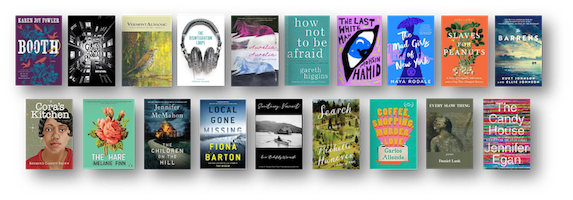Episodes

Tuesday Mar 23, 2010
Write The Book #89 (3/22/10) Tim Brookes
Tuesday Mar 23, 2010
Tuesday Mar 23, 2010
Interview with local author Tim Brookes about his new book, Thirty Percent Chance of Enlightenment. Prompt: This week, instead of a Write The Book Prompt, I offer what I'm calling an "anti-prompt." When I asked my guest, Tim Brookes, if he had a prompt to suggest, he answered with a very firm "no." Tim does not use prompts, and as a teacher, he does not assign them. When I asked him if I might offer his opinion this week, instead of a prompt, he wrote me the following email. Perhaps you'll find it useful.
I guess I'm anti-prompt for the same three reasons why I'm against that rhetoric/debate exercise where the teacher says, "Which side are you on when it comes to this issue? Okay, in that case, argue the opposite side."
One, I want my writers to discover what they have to say by paying attention to their own inner landscape, their own issues, passions, dark corners.
Two, that's not the way it works in real life.
Three, it takes a writer absolutely at the top of his/her game to be able to pull that off well.
One: it takes a great deal of time and practice for a young writer even to be aware of what s/he has to say, let alone to have the confidence and the means to say it powerfully. To me that's a crucial, crucial goal. Writing to a prompt produces reactive writing--writing to please someone else, writing to respond to someone else--which actually takes the writer's focus away from what is most important to him/her. For the prompt to strike home and hit a subject of genuine urgency and importance to the writer is like throwing a dart across the street and trying to hit the bulls eye of a dartboard on the other side of the traffic. Giving prompts is a way to get writing from the student, but not a way of helping the student become a writer. It's a recipe for bullshit.
Two: In all the twenty years I was writing for NPR--the form that's closest to the kind of short personal essay/poem product that writing prompts are usually intended to provoke-I was only ever asked to respond to a specific subject twice. My best feature-story editor used to say to me, "What do you want to spend three months learning about?" It's true that a good many journalists are given assignments they have to go and cover, but they themselves would rarely claim that daily grind produced their best writing. The fact is, we writers write best about the things that matter to us. Sometimes we can bring that passion to a subject that was assigned to us, but more often that's not the case. If you want student writers to write like professional writers, have them talk to poets/novelists/essayists and ask them, "How do you reach your best writing?" and see what they say. And here's the real problem: none of those writers will say, "I sit down in a regularly scheduled English class at 10:10 every Tuesday and Friday and whatever's going on inside me or around me I always find something to say." Bollocks.
Three: It is possible to write well from a prompt--and in a sense editorial writers do it all the time--but there's a reason why a newspaper's editorials are written by the most seasoned, experienced, widely-read writers on the staff. You need to have an astonishingly wide range of reference in order to have a chance of understanding the subject, let alone saying anything worthwhile; you need a deep sense of form and structure to be able to create a finished piece of given proportions in a limited time; and you need to be capable of interesting turns of phrase under pressure. Student writers try desperately to ape that kind of skill, but they also know that 85% of what they write is bullshit. I know: I've asked them. So I'd far rather have them attempt something that genuinely means something to them. Even the act of trying to access that genuine subject is worth more than facility at writing a poem on Spring at the drop of a hat.
So what do I use instead of prompts?
I usually just say, "Think back to an incident or a conversation (conversation is better, as it's much more specific) that you've had, or you've witnessed, from the past twelve months, one that you recall with some kind of strong emotion. Now write about that in as much detail as you can remember."
So that's Tim's take on prompts. I offer his words as encouragement to anyone who doesn't tend to find them helpful or generative. For those of you who do like them, the prompt will be back next week. I may rename it, though... hmm. Good luck with your writing this week!
Friday Mar 19, 2010
Write The Book #88 (3/15/10) Creston Lea
Friday Mar 19, 2010
Friday Mar 19, 2010
Interview with Vermont author Creston Lea, whose story collection, Wild Punch, comes out this spring from Turtle Point Press. Prompt: This week's Write The Book Prompt was suggested by my guest, Creston Lea. He says that a useful activity for writers is to eavesdrop. Go to a bar or a restaurant and listen in. According to Creston, chances are, you'll hear something worth stealing. Good luck with this exercise, and please listen next week for another.

Thursday Mar 11, 2010
Write The Book Archives #87 (3/8/10) David Jauss
Thursday Mar 11, 2010
Thursday Mar 11, 2010
Interview with Poet and Short Fiction Writer David Jauss. Prompt: This week's Write The Book Prompt was inspired by work of my guest, David Jauss. As we discussed in the interview, David published an essay titled, "Remembrance of Things Present: Present Tense in Contemporary Fiction," in the March/April 2002 issue of the AWP Chronicle. Here is a quote from that article:
Whatever the causes for the prevalence of the present tense in our fiction, it is important that we understand its advantages and disadvantages, so we can better decide when to use it. Our principal concern as writers ought to be to choose those techniques which best serve the particular story we're writing...
As an exercise this week, experiment with tense. If you have a story or a narrative poem that doesn't seem to be working, see what happens if you change the tense. Consider the level of immediacy that you want to bring to the piece. Think, too, about how tense affects narrative introspection, and how it might heighten or detract from the overall theme, or sense of what you're trying to accomplish. As you study the piece, written in different tenses, you may find you have an instinctive reaction about which is the best way to go.
Tuesday Mar 02, 2010
Write The Book #86 (3/1/10) Howard Frank Mosher
Tuesday Mar 02, 2010
Tuesday Mar 02, 2010
Interview with Vermont author Howard Frank Mosher. Prompt: This week’s Write The Book Prompt was inspired by the interview you heard today. Howard Frank Mosher mentioned during our talk that he had twice, in the course of writing his new book, Walking To Gatlinburg, asked his wife Phyllis to cast and read Nordic runes as a helpful form of inspiration. He did this partly because Phyllis was studying runes at the time, and partly because runes were the inspiration for the Kingdom Mountain pictographs that play a role in his new book. This week's Write The Book Prompt, then, is to cast runes. For help in understanding how to do this, try these websites (or Google "Nordic Runes," and see if you find other references): http://www.ehow.com/how_5830139_make-own-rune-set.html http://www.runemaker.com/casting.shtml Set yourself a question or problem that you'd like to resolve in your work, and let the runes offer suggestions. These could inspire a course of action for your character, for yourself, for the plot, or for the structure of the project. Keep your mind open and see what presents itself. Good luck with this exercise, and please listen next week for another. Music credits: 1) “Dreaming 1″ - John Fink; 2) “Filter” - Dorset Greens (a Vermont band featuring several South Burlington High School students)

Sunday Feb 28, 2010
Write The Book Archives #85 (2/22/10) Kathryn Davis
Sunday Feb 28, 2010
Sunday Feb 28, 2010
Interview with author Kathryn Davis. Prompt: This week’s Write The Book Prompt was inspired by the interview you heard today with novelist Kathryn Davis. To avoid getting stuck and maintain her interest in an ongoing project, Kathryn said she does two main things. First, she does not read over what she’s written at the end of a given writing session; she waits and reads that work when she next sits down to write. Second, as she finishes each writing session, she winds down by allowing herself to free write for a page or so. This encourages thoughts and ideas that might have been deterred by her more focused or controlled thought process as she was working. She mentioned that useful ideas often come out of this end-of-day free writing. The next time you write, try these two strategies. First, do not allow yourself to read over your work when you finish writing at the end of a given day. Wait until your next writing session. And second, spend five or ten minutes free writing after a regular, disciplined writing session, and see what fresh, useful and relevant ideas might result. Music credits: 1) “Dreaming 1″ - John Fink; 2) “Filter” - Dorset Greens (a Vermont band featuring several South Burlington High School students)



